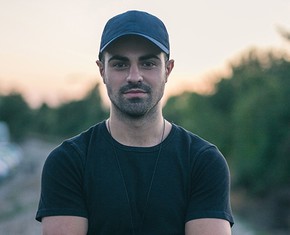The views expressed in our content reflect individual perspectives and do not represent the authoritative views of the Baha'i Faith.
Sadly, a family member of mine just passed away, leaving behind a wife and kids. Everyone is distraught—so what happens next?
Now the family, like so many others around the world, faces a major decision: cremation or burial? When a loved one passes away—which happens, sooner or later, to everyone—we quickly begin a journey into the known or unknown wishes of the family or the deceased. Of course, many families never talk about these issues, so they’re forced to make a quick decision. As we scan for help online, ads like these blaze across the screen:
A funeral is supposed to let you say goodbye to your loved ones, not to your savings account.
A man seated on a log by a burning fire with the caption… “No fuss.”
When I saw the cost of the funeral I nearly died.
These advertisements, designed to persuade us to cremate the bodies of our deceased loved ones, remind us that cremation may cost less and be easier to arrange than a burial in a cemetery. Because of those material factors, cremation has become a growing cultural trend in the US and other parts of the world. In fact, the number of cremations in the US almost doubled in the past 15 years, according to data from the Cremation Association of North America. In 1999, 25% of all deceased Americans were cremated, and in 2014 that percentage rose to 47%. At that pace in the United States, cremations should reach a full half of all deaths by 2019.
Let’s Talk about an Uncomfortable Subject: Burial Versus Cremation
In many cultures, death is definitely an uncomfortable subject for most people to think about. It doesn’t paint a pretty picture; it’s personal and rarely discussed. But it’s a reality for everyone, so let’s talk about it.
In our family, as we surveyed ads and considered our options, I was so surprised to learn that everyone in my husband’s family wants to be cremated, even my mother-in-law, a devout Catholic. I thought the Catholic Church didn’t permit cremation—but a quick online search showed me that the Vatican lifted the ban on cremation in 1963.
So when friends began offering condolences and inquiring how they could help, I decided to survey their opinions. I asked: “What would you choose for yourself, cremation or burial?” Many said cremation, except two who were undecided. That surprised me again, because most religions, especially in the western world, have opposed cremation for a very long time. I decided to do some research and educate myself a little.
Is Cremation Bad For the Soul?
I knew that some—but not all—followers of the Hindu, Buddhist and Jain Faiths practiced cremation and have done so for a long time. But I learned, after some searching, that the majority of the Abrahamic religions—Judaism, Christianity, Islam and the Baha’i Faith—encourage burial over cremation.
In traditional Judaism, I learned, cremation was outlawed for centuries. Because of the doctrine of resurrection (in Judaism and Christianity both), Jews believed in leaving the deceased in their natural state rather than altering the body in any way. Jewish teachings say the body is sacred—the temple of the soul—and so Halachah, Jewish law, unequivocally says that the dead must be buried in the Earth.
In historical Christianity, especially in the earliest centuries of Catholicism, cremation was also forbidden, and thought of as one of the most sacrilegious of all acts. In fact, the Christian king Charlemagne made cremation a capital crime in 789 AD. Although cremation has become an accepted practice among some modern Christians during the past century, traditional Catholics, the Eastern Orthodox church and many Protestant denominations still avoid it, believing that it contravenes the concept of the resurrection.
Islam forbids cremation and considers it “haram”—an unclean practice and a sacrilege. Islamic law prescribes specific funeral rites, including washing the body and treating it with the same respect and honor given to a live person. As most religions do, Muslims believe that human consciousness survives death, and that the soul is aware of the body’s treatment and burial.
RELATED: The Survival of the Soul After Death
The Baha’i Faith also encourages its followers to avoid cremation, for many reasons—including ones that have to do with maintaining the balance of nature and its cycles:
The body of man, which has been formed gradually, must similarly be decomposed gradually. This is according to the real and natural order and Divine Law. If it had been better for it to be burned after death, in its very creation it would have been so planned that the body would automatically become ignited after death, be consumed and turned into ashes.
But the divine order formulated by the heavenly ordinance is that after death this body shall be transferred from one stage to another different from the preceding one, so that according to the relations which exist in the world, it may gradually combine and mix with other elements, thus going through stages until it arrives in the vegetable kingdom, there turning into plants and flowers, developing into trees of the highest paradise, becoming perfumed and attaining the beauty of colour.
Cremation suppresses it speedily from attainment to these transformations, the elements becoming so quickly decomposed that transformation to these various stages is checked.
You May Also Like
Comments

















https://bahaiteachings.org/rather-buried-cremated/
For example, this elemental human body hath come forth from the mineral, the vegetable and the animal worlds, and after its death will be entirely changed into microscopic animal organisms; and according to the divine order and the driving forces of nature, these minute creatures will have an effect on the life of the universe, and will pass into other forms.
Now, if you consign this body to the flames, it will pass immediately into the mineral kingdom and will be kept back from its natural journey through the chain of ...all created things. – Abdu’l-Baha, The Wisdom of Burying the Dead.
Besides the cost differences, cremation allows the bodies to decompose must swifter than through burial. Here’s why this is so important –https://thespiritconsciousness.com/2019/01/22/death-practices-cremation-burial/
http://miltonfieldsgeorgia.com/faqs.php
Since our Holy Writings tell us that, after death, the human body "must ... be decomposed gradually," how are we to handle our departed loved ones who are not Baha'i? In the absence of compelling legal requirements that dictate burial requirements, do we follow, say, their "I want to be cremated" earthly desire or do we follow our own knowledge of what the Manifeststion of God for this day advised for burial?
I, for one, am glad I will not have to make that decision for me, but my ...heart aches for those who have to make the decision for their departed loved ones.
placing the body in a pod and planting a tree in the dirt on it so that the nuterients from the decomposing body fed the growing tree. Is this acceptable?